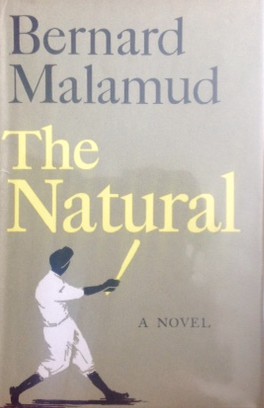Inspiring Older Readers
 posted on 28 May 2018
posted on 28 May 2018
The Natural by Bernard Malamud
Originally published in 1952, Malamud’s The Natural uses the US national obsession with the game of baseball as the framework for constructing a novel that operates on a number of different levels. It’s probably worth saying at this point that it’s not strictly necessary to have any familiarity with the game and rules of baseball to appreciate the book – although Malamud does provide a sort of working glossary of baseball terms at the end of the novel for those who might want to know what terms like a ‘double play’ or a ‘bunt’ mean. Having said that, I have been to a couple of baseball games in the States and I did find it helpful in understanding the kind of atmosphere that exists during the games and the passions that baseball generates in the extraordinarily partisan crowds.
The book is the story of Roy Hobbs, a baseball phenomenon in the making, a natural who is scouted from the sticks and given his chance at a trial for the big time. He never makes it though because when he arrives in Chicago he’s lured into a hotel room and shot in the stomach by a seductive young woman, Harriet Bird, who gets her kicks from killing the top sports stars.
We then pick up the story fifteen years later when Hobbs, a grizzled veteran approaching his mid-thirties, gets another chance at redemption – a chance to get back into the big time with a struggling team called The New York Knights.
Hobbs has his own handcrafted baseball bat he calls Wonderboy and with it he makes a rapid rise to stardom. But it is always a precarious sort of fame because Hobbs is constantly having to deal with his own fatal flaws – a weakness for women and an inability to control his appetites. Malamud also suggests that Hobbs will eventually be punished for his hubris which manifests itself as an unshakable belief that he deserves and should be given the fame and glory he was robbed of when he was young.
So although this is ostensibly a story about baseball it becomes clear pretty quickly that Malamud has bigger fish to fry. The game and it’s legendary trappings become, in Malamud’s hands, an allegory of heroism and failure based on Arthurian legend. Amy Lerner writing on the Fig Tree Books website describes Malamud’s purpose this way:
"This is a modern novel that skilfully incorporates ancient themes. The plot echoes the story of the Fisher King and Perceval’s search for the Holy Grail: “Wonderboy,” a magical baseball bat, is Roy’s Excalibur; the (surely carefully named) Pop Fisher, the team manager, the king who yearns for the Holy Grail of championship."
There is also something of the Shakespearean tragedy in the story of Hobbs who finds himself at the summit of his public fame only to be brought down by his essential human weakness and the inevitability of fate.
It also seems to me that Malamud’s choice of the notion of ‘the natural’ is important too and touches on the Romantic concept of the natural man or noble savage who is capable of transcendent achievement but is ultimately corrupted by proximity to so-called civilisation and the treachery of those he gets close to.
Malamud’s novel is a rich, multi-layered achievement that deserves to be ranked alongside the very best of his contemporaries – Roth, Updike and Bellow – and one which left me at the end feeling that I’d read something that would continue to percolate away in my mind for years to come.
Terry Potter
May 2018